中美文化差异概况(英文版)
- 格式:ppt
- 大小:1.99 MB
- 文档页数:50
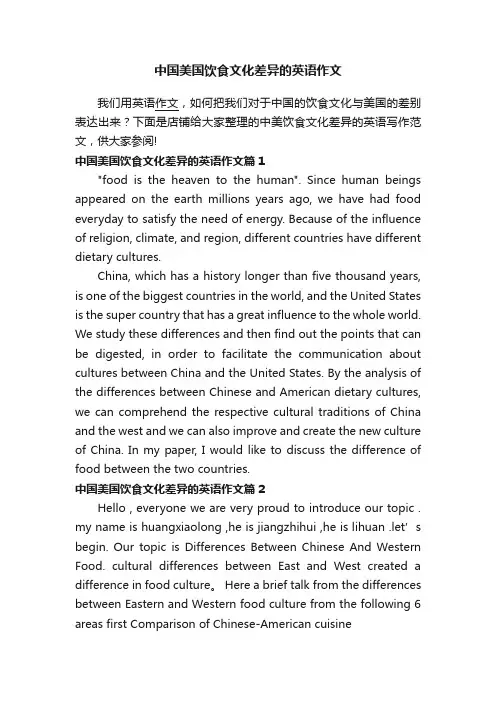
中国美国饮食文化差异的英语作文我们用英语作文,如何把我们对于中国的饮食文化与美国的差别表达出来?下面是店铺给大家整理的中美饮食文化差异的英语写作范文,供大家参阅!中国美国饮食文化差异的英语作文篇1"food is the heaven to the human". Since human beings appeared on the earth millions years ago, we have had food everyday to satisfy the need of energy. Because of the influence of religion, climate, and region, different countries have different dietary cultures.China, which has a history longer than five thousand years, is one of the biggest countries in the world, and the United States is the super country that has a great influence to the whole world. We study these differences and then find out the points that can be digested, in order to facilitate the communication about cultures between China and the United States. By the analysis of the differences between Chinese and American dietary cultures, we can comprehend the respective cultural traditions of China and the west and we can also improve and create the new culture of China. In my paper, I would like to discuss the difference of food between the two countries.中国美国饮食文化差异的英语作文篇2Hello , everyone we are very proud to introduce our topic . my name is huangxiaolong ,he is jiangzhihui ,he is lihuan .let’s begin. Our topic is Differences Between Chinese And Western Food. cultural differences between East and West created a difference in food culture。
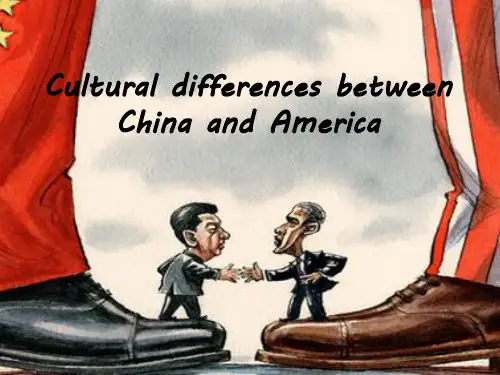
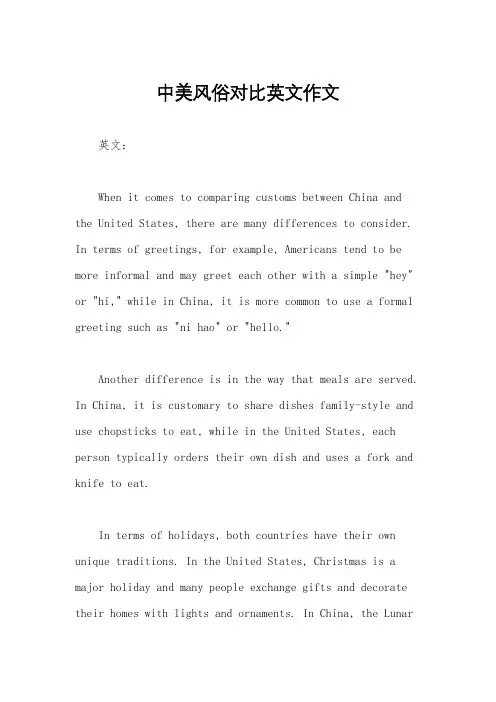
中美风俗对比英文作文英文:When it comes to comparing customs between China and the United States, there are many differences to consider. In terms of greetings, for example, Americans tend to be more informal and may greet each other with a simple "hey" or "hi," while in China, it is more common to use a formal greeting such as "ni hao" or "hello."Another difference is in the way that meals are served. In China, it is customary to share dishes family-style and use chopsticks to eat, while in the United States, each person typically orders their own dish and uses a fork and knife to eat.In terms of holidays, both countries have their own unique traditions. In the United States, Christmas is a major holiday and many people exchange gifts and decorate their homes with lights and ornaments. In China, the LunarNew Year is a significant holiday and people often celebrate with family gatherings, fireworks, and special foods.One similarity between the two cultures is the importance of family. Both Chinese and American families place a high value on spending time together and supporting one another. However, the way that families express this value may differ.Overall, there are many cultural differences and similarities between China and the United States. It is important to be aware of these differences in order to better understand and appreciate each other's customs and traditions.中文:当谈到比较中国和美国的风俗习惯时,有许多差异需要考虑。
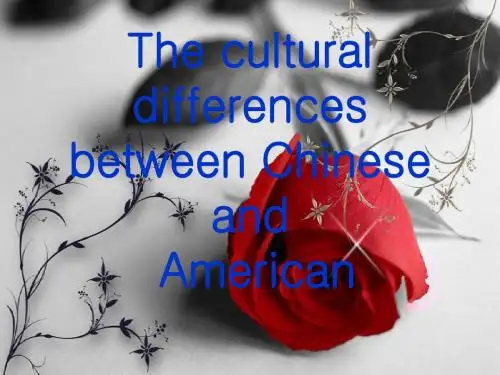
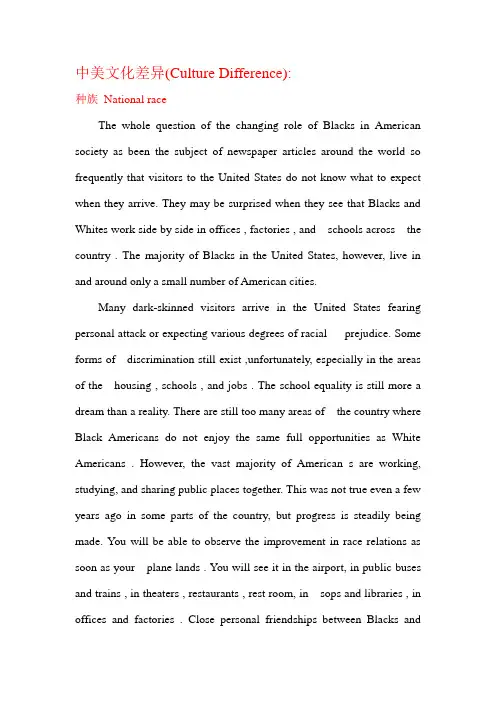
中美文化差异(Culture Difference):种族National raceThe whole question of the changing role of Blacks in American society as been the subject of newspaper articles around the world so frequently that visitors to the United States do not know what to expect when they arrive. They may be surprised when they see that Blacks and Whites work side by side in offices , factories , and schools across the country . The majority of Blacks in the United States, however, live in and around only a small number of American cities.Many dark-skinned visitors arrive in the United States fearing personal attack or expecting various degrees of racial prejudice. Some forms of discrimination still exist ,unfortunately, especially in the areas of the housing , schools , and jobs . The school equality is still more a dream than a reality. There are still too many areas of the country where Black Americans do not enjoy the same full opportunities as White Americans . However, the vast majority of American s are working, studying, and sharing public places together. This was not true even a few years ago in some parts of the country, but progress is steadily being made. You will be able to observe the improvement in race relations as soon as your plane lands . You will see it in the airport, in public buses and trains , in theaters , restaurants , rest room, in sops and libraries , in offices and factories . Close personal friendships between Blacks andWhites , full trust and social relationships are still not common , except in certain areas,However, even in this - the slowest area of progress-there has been change , especially among young people.文化差异(Culture Difference):财富与特权Wealth and PrivilegeOwning cars , large houses , or swimming pools mean different things in different cultures and may confuse a visitor to the United States . In many nations , only the rich have such things as cars and swimming pools ; the poor have very little.By contrast, this is not true in the United States . The cost of certain things that only the rich can afford in other countries is relatively low. This means that laborers , farmers , and people who are not usually regarded as rich nevertheless have many possessions tat only the rich have in other nations . Understandably a visitor may assume that all Americans who own cars are as rich as people in his own country who own cars . Actually , this is not the cases; secretaries, university students , factory workers or farmers can and do buy cars and many other "expensive " things . Generally , they pay for these possessions gradually , during a period of many months , or even years , so that the cost each most is not too high in relation to their monthly wages .文化差异(Culture Difference):个人的进步Personal ProgressIn many parts of the world , personal influence is essential in achieving success. This is not true in the United States, where success usually results from hard work , education, skill, and personal initiative , America is truly a"do-it-yourself" society ; success is not dependent on family origins or the help of an influential person . Personal progress is the result of individual effort.Because effort and initiative are so important in America , there are many customs that may be different from those practiced in other countries. For example , it is not considered dishonorable to quit a job, even if you have had it for only a short time . Moving from job-to -job , or "job-hopping ", as it is called , is quite acceptable in the United States. Frequently , the opportunity to change jobs offers workers a chance to move up to a better position. Americans like to move from place to place trying new jobs, meeting new people and living in different parts of the country. "Job-hopping" also gives employers a chance to benefit from the new ideas and skills that different people bring to their jobs even if such people are employed for only a short time.文化差异(Culture Difference):真实还是礼貌?Truth or Courtesy ?Just as the degree of individual freedom that exists in America seems loose and therefore uncomfortable to many visitors . In many countries , people will tell you what they think you want to here , whether or not itis true. To them , this is the polite thing to do. To Americans it is considered confusing -even dishonest -to avoid telling the true facts. even if avoiding the truth is done only to be polite . It is helpful to remember that different cultures consider some matters more important than others . Wit Americans , however, trust and truth are most important. One of the worst tings that can be said about someone in America is that " you cannot trust him"Considering such differences in values among the many cultures of the world, it is natural that misunderstandings [1] will occur. "How far is it to the next town?" an American asks a man standing by the edge of a road. In some countries , because the man realizes the traveler is tired and eager to reach the next village, he will politely say , ' Just down the road ". He thinks this is more encouraging, gentler, and therefore the answer the traveler wants to hear. So the American drives alone for many more hours before he comes to the village. The traveler is angry, feeling "tricked". He thinks that the man has purposely lied to him because he must have know quite will well what the distance was.If a visitor to the United States asked an American standing at the edge of a road how far the next town was, the American would think it dishonest if he said it was near when he knew it was really 24 miles away. Although he, too, would be sympathetic with the tired traveler , he would say, "You have a long way to go yet ; it is at least 24 miles more. " Thetraveler might be disappointed , but he would know what to expect, and there would be no misunderstanding.文化差异(Culture Difference):美国社会正在改变American Society is ChangingIn many nations , everyday activities are done in a planned , orderly manner. For example , formal relationships among people may be determined according to customs and habits that have existed for a long time . People visiting an informal country , such as the United States , may find that the American belief in personal initiative or freedom (including the freedom to disagree with those in authority ), and the whole economic system is quits confusing and uncontrolled . To some visitors such freedoms are too "loose" and too disorganized to be comfortable.Today , the United States is experiencing great change in every part of society ;therefore life in America may indeed seem confused . Social attitudes are being questioned . Americans are wondering: "Is there any morality ?""Why has the nation never given all of its citizens full opportunity ?""What courses should be taught in school?""What is the role of women in society ? "As visitors , you will notice that some Americans are beginning to leave the cities and make their homes in small cities and towns where life is quieter and slower . Political beliefs are changing . The kinds of skills needed by workers today differ fromthose in demand several years ago.文化差异(Culture Difference):权威AuthorityIn many countries , authority is seldom , if ever, questioned , either because it is highly respected , or because it is feared . Sometimes , too, Because rank has been important in certain societies for a long time, people have been trained never to question those in authority .. For example , children are not expected to question their teachers in school .It may be considered improper for young businessmen to suggest ideas that differ from those of older, more experienced members of the business.In other countries, including America, children are trained to question and search for answers . When a child asks a question, he will often be told to go to the library and find the answer for himself. By the time students reach the age of 14 or 15, they may be developing exciting new ideas in all fields of science and the arts . To encourage such creativity [1] , there are many national prizes offered to students , every year for their scientific discoveries and artistic accomplishments.This interest in questioning and searching may be considered by some people as bad for young people's manners , that young people lack respect for authority . This impression may be created when visitors notice young Americans asking questions and arguing with older people . However , this is because many Americans have a different attitudetoward authority than may exist in other areas of the world . In a work or business situation, ideas are freely and openly discussed and argued. It is important to remember tat it is the person's ideas that are being questioned, not the individual himself..The two are quite separate. The purpose of the searching , questioning , and arguing is to find the facts in a particular situation, and therefore a solution, so that the work of the business can progress in the most effective manner possible.As was mentioned earlier, you may notice the some questioning in social conversations . Although some individuals may think that Americans are rude because of their direct manner with people, they are merely trying to learn more about your ideas.文化差异(Culture Difference):Table Manners: a Cultural DifferenceFor many Westerners, the Chinese dinner table is terra incognita([拉]未发现的地域). There are no forks or knives for the Westerners to use. The Chinese host makes great, sweeping(大范围的)arm movements that go over large sections of the table passing over both food and friends alike. The scene is fantastic(非常好的), but it leaves many foreigners at a loss(让……迷惑)for what to do. In most Western restaurants and homes there are rules about how to talk, eat and sit that are highly restrictive(受限制的), and they create an atmosphere(气氛)that is completely different from what we find here in China. In my childhoodhome, dinner was enjoyed with hushed(压低声音的) voices, and the topics open for discussion were very much restricted. We were not allowed to bring up anything that was potentially unappetizing(倒胃口的); body functions(上洗手间), bugs, murder and mayhem(使人肢体伤残的行为)in general were all strictly forbidden topics. If I had to leave the table to use the toilet, I had to verbally excuse myself without mentioning what it was that I was going to do. "May I be excused, please?I need to wash my hands." I would say.My mother would say, "Sure." My father would often play a joke on us by saying, "Your hands don't look dirty to me!"As for eating, we did it quietly. No eating noises were allowed.Everything must be done as quietly as possible. Therefore, we had to eat with our mouths closed. To make a "smacking" noise was, perhaps, the worst offence possible. While drinking soup or coffee or wine "slurping"(咕嘟咕嘟地喝)was also forbidden. If any sound whatever was created by our intake of food or beverage(饮料), it constituted(构成)bad manners! With that in mind, it was, of course, unthinkable to speak with one's mouth full of food, so speaking only occurred(发生)before or after one had taken in food and swallowed(吞咽)it.How one sits at the table is also prescribed(被规定的). One is to sit up straight with the recessive(非主导的,隐性的)hand (usually the left) in one's lap holding a napkin(餐巾)while the dominant hand (usually theright) holds the fork or spoon. The only time one is allowed to have both hands on the table is when one is using a knife to cut something, but as soon as the cutting is done, the recessive hand goes back to the lap. Also, elbows(肘)are not allowed on the table. Therefore, one props(撑着)the arm against the edge of the table just below the elbow. One should never reach for(伸手拿)any food on the table; one should ask someone sitting near it to give it to you. "Would you please pass the potatoes?" "May I trouble you for the salt?" These are phrases that you are likely to hear on any given night of the week at a family dinner.When a guest comes from the West to enjoy a meal with you, it would be a good idea for you to explain to your guest what will happen at dinner and to find out if a fork would be easier to use than chopsticks(筷子). In my time in China, I have come to enjoy Chinese table manners far more than those prescribed by my own culture, but for many it is impossible to adjust(适应). The best policy is to ask your guest questions to find out what he or she is comfortable with.文化差异(Culture Difference):社会SocietyThe United States, like other countries has its rich and poor people , its rich and poor neighborhoods.Americans love --- and many are themselves living examples of ---the "self-made man. "You will hear this expression often. But forevery person who is successful. They are usually better educated tan their parents and therefore more likely to have good, well paying jobs.In addition to the fact that the United States includes people whose families originally came from many other parts of the world , Americans move across the nation in great numbers. One study reported that one of every five families in the United States moves every three years. This continuous mixing of people into new communities is an important observation to consider when trying to understand the meaning of class in America. We have already discussed the questioning, "do-it -yourself" American personality that is another important consideration.In many countries, a man's social class is determined at birth . That is , his social class or position is shared with his family , his wider group of relatives . In the United States , position in society is , to a large degree, personal rather than related to family or group.Before World War Two, family ties were more important America than they are now. Uncles, aunts grandparents , and children vacationed together, spent holidays together, and saw much of each other. But as the American economy developed more rapidly after the war, social customs began to change. With the rapidly growing economy, there were new employment opportunities, many of them in scientific fields. These opportunities were often located in other parts of the country. The younger members of many families who were will educated began tomove away from the towns where their families lived to tale these new jobs. As these young people became successful, they often moved into a new social stratum [1], consisting of others who, like themselves, moved away from home to follow job opportunities.These same changes are already happening in most new countries around the world. Today, a man who can read or fix a machine may become the new leader of his community in place of an older person. Often young people can better understand the new sciences and modern skills ; as these young people learn and advance , their wages rise and they become increasingly successful.Frequently, it is just one member of a family that becomes very successful. Other members continue working at their average jobs and salaries, without much chance of becoming as successful as the son or daughter. When this happens, people sometimes become separated from their family. Many return to visit, but others move away never to return to their relatives and old friends.To many people, success means having more power than one possessed before. It can be won through skill, knowledge , leadership, or sometimes just by hard work .In America, "success" has normally bee accompanied by an increase in wealth. As a result, an individual 's social position is determined both by a person's job and by the kinds of possessions he owns .As we said , however, young people are in the process of developing different values and different ways to measure success.[1] stratum n. [地] 地层, [生](组织的)层, 社会阶层。
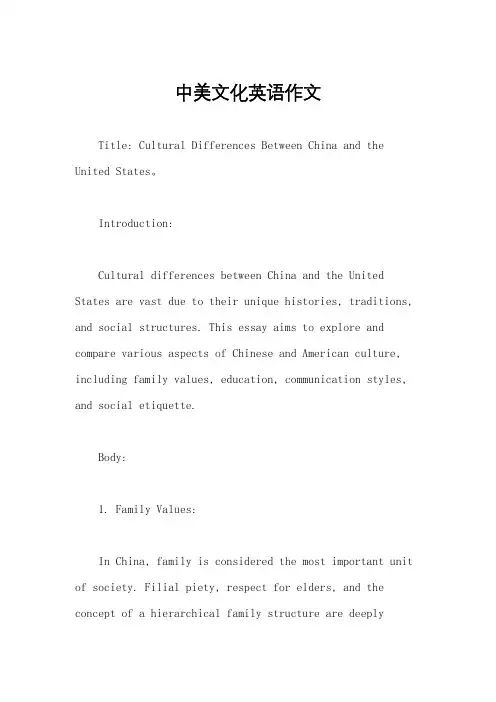
中美文化英语作文Title: Cultural Differences Between China and the United States。
Introduction:Cultural differences between China and the United States are vast due to their unique histories, traditions, and social structures. This essay aims to explore and compare various aspects of Chinese and American culture, including family values, education, communication styles, and social etiquette.Body:1. Family Values:In China, family is considered the most important unit of society. Filial piety, respect for elders, and the concept of a hierarchical family structure are deeplyingrained. Parents often make decisions for their children, and multigenerational households are common. In contrast, American families tend to prioritize individualism and independence. Children are encouraged to express their opinions, and nuclear families are prevalent.2. Education:Education is highly valued in both China and the United States, but the systems differ significantly. In China, there is immense pressure on students to excel academically, and rote memorization is emphasized. The Gaokao, China's national college entrance exam, is a determining factor for future success. In the U.S., education focuses on critical thinking, creativity, and holistic development. Extracurricular activities, such as sports and arts, play a vital role in American education.3. Communication Styles:Chinese communication tends to be more indirect and implicit, emphasizing harmony and saving face. Non-verbalcues, such as facial expressions and body language, are crucial in understanding the underlying meaning. In contrast, Americans value directness and clarity in communication. They tend to express their opinions openly and appreciate straightforwardness.4. Social Etiquette:Social etiquette varies greatly between China and the U.S. In China, saving face and maintaining harmony are essential. It is customary to exchange business cards with both hands, and punctuality is highly valued. In the U.S., personal space is respected, and casual greetings like handshakes are common. Being on time is considered respectful, and punctuality is expected in professional settings.5. Festivals and Traditions:China and the U.S. have unique festivals and traditions. Chinese New Year, also known as Spring Festival, is themost important holiday in China. It involves familyreunions, firework displays, and traditional customs like giving red envelopes. In the U.S., Independence Day on July 4th is celebrated with parades, barbecues, and fireworks to commemorate the country's freedom.Conclusion:The cultural differences between China and the United States are evident in various aspects of life, including family values, education, communication styles, social etiquette, and traditions. Understanding and appreciating these differences can foster mutual respect and enhance cultural exchanges between the two nations. By learning from each other's strengths and embracing diversity, we can build stronger relationships and promote global harmony.。
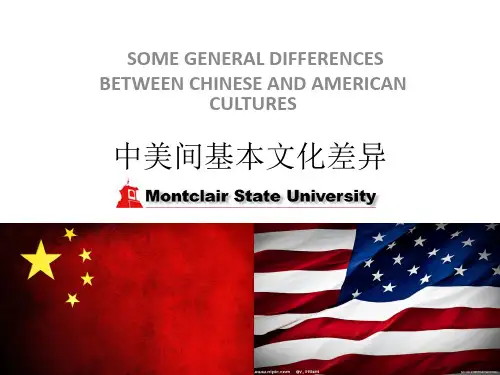
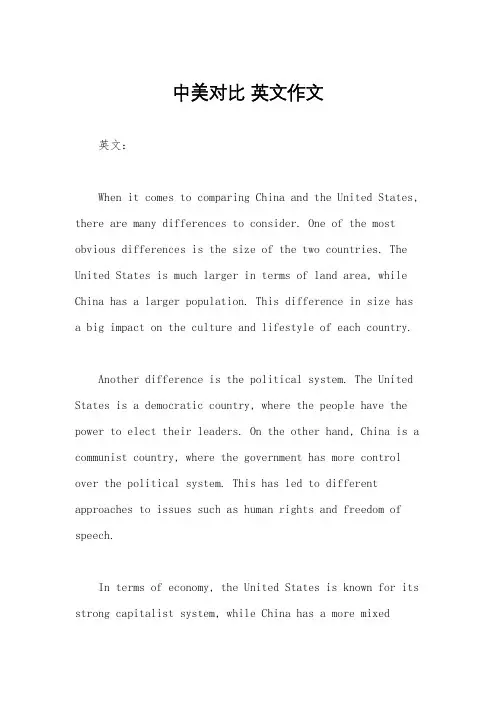
中美对比英文作文英文:When it comes to comparing China and the United States, there are many differences to consider. One of the most obvious differences is the size of the two countries. The United States is much larger in terms of land area, while China has a larger population. This difference in size has a big impact on the culture and lifestyle of each country.Another difference is the political system. The United States is a democratic country, where the people have the power to elect their leaders. On the other hand, China is a communist country, where the government has more control over the political system. This has led to different approaches to issues such as human rights and freedom of speech.In terms of economy, the United States is known for its strong capitalist system, while China has a more mixedeconomy with elements of both capitalism and socialism. This has led to different approaches to business and trade, as well as different levels of wealth and income distribution.In terms of culture, both countries have rich histories and traditions. However, there are some distinct differences. For example, Chinese culture places a strong emphasis on family and respect for elders, while American culture values individualism and personal freedom.Overall, while there are many differences between China and the United States, there are also many similarities. Both countries have diverse populations and rich cultural heritages. It's important to recognize and appreciate the differences while also celebrating the commonalities.中文:当谈到比较中国和美国时,有许多不同之处需要考虑。
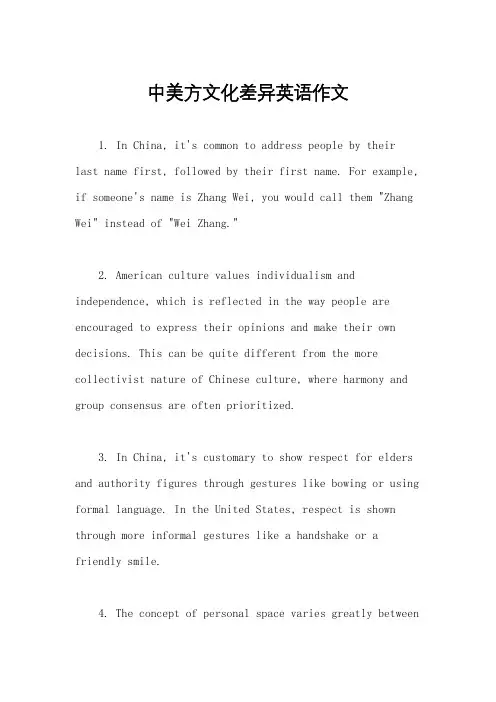
中美方文化差异英语作文1. In China, it's common to address people by theirlast name first, followed by their first name. For example, if someone's name is Zhang Wei, you would call them "Zhang Wei" instead of "Wei Zhang."2. American culture values individualism and independence, which is reflected in the way people are encouraged to express their opinions and make their own decisions. This can be quite different from the more collectivist nature of Chinese culture, where harmony and group consensus are often prioritized.3. In China, it's customary to show respect for elders and authority figures through gestures like bowing or using formal language. In the United States, respect is shown through more informal gestures like a handshake or a friendly smile.4. The concept of personal space varies greatly betweenChina and the United States. Americans tend to value their personal space and may feel uncomfortable with too much physical contact, while in China, it's common for people to stand closer together and have more physical contact during conversations.5. Chinese culture places a strong emphasis on family and filial piety, with children expected to care for their parents as they age. In contrast, American culture often encourages young adults to pursue their own independence and create their own path in life.6. When it comes to food, Chinese cuisine tends to be more diverse and includes a wide range of flavors and textures. American food, on the other hand, is often associated with fast food and larger portion sizes.7. In terms of communication style, Chinese people may be more indirect and use nonverbal cues to convey their feelings, while Americans tend to be more direct andexplicit in their communication.8. In China, the concept of "saving face" is important, and people may go to great lengths to avoid causing embarrassment or shame. In the United States, there is generally less emphasis on maintaining a public image and people may be more open about their mistakes or shortcomings.9. Traditional Chinese values place a strong emphasis on humility and modesty, while American culture often celebrates self-promotion and confidence.10. Chinese culture has a long history and deep-rooted traditions, while American culture is more influenced by innovation and progress. This can be seen in the way each culture approaches change and adaptation.。
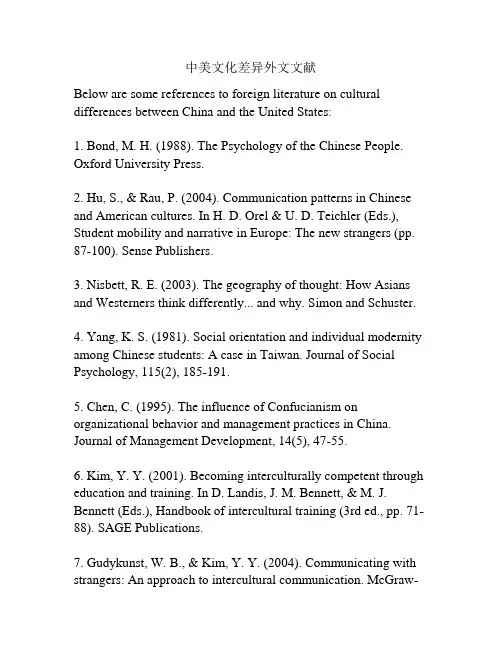
中美文化差异外文文献Below are some references to foreign literature on cultural differences between China and the United States:1. Bond, M. H. (1988). The Psychology of the Chinese People. Oxford University Press.2. Hu, S., & Rau, P. (2004). Communication patterns in Chinese and American cultures. In H. D. Orel & U. D. Teichler (Eds.), Student mobility and narrative in Europe: The new strangers (pp. 87-100). Sense Publishers.3. Nisbett, R. E. (2003). The geography of thought: How Asians and Westerners think differently... and why. Simon and Schuster.4. Yang, K. S. (1981). Social orientation and individual modernity among Chinese students: A case in Taiwan. Journal of Social Psychology, 115(2), 185-191.5. Chen, C. (1995). The influence of Confucianism on organizational behavior and management practices in China. Journal of Management Development, 14(5), 47-55.6. Kim, Y. Y. (2001). Becoming interculturally competent through education and training. In D. Landis, J. M. Bennett, & M. J. Bennett (Eds.), Handbook of intercultural training (3rd ed., pp. 71-88). SAGE Publications.7. Gudykunst, W. B., & Kim, Y. Y. (2004). Communicating with strangers: An approach to intercultural communication. McGraw-Hill.8. Hofstede, G., & Hofstede, G. J. (2005). Cultures and organizations: Software of the mind. McGraw-Hill.9. Liu, X. (2004). Comparative cultural values between Chinese and Americans: An exploration based on Hofstede's dimensions. Cross Cultural Management: An International Journal, 11(2), 30-49.10. Zhu, Y. (2006). Studying Chinese cultural differences: A review and proposed research agenda. Journal of International Consumer Marketing, 18(3), 69-81.。
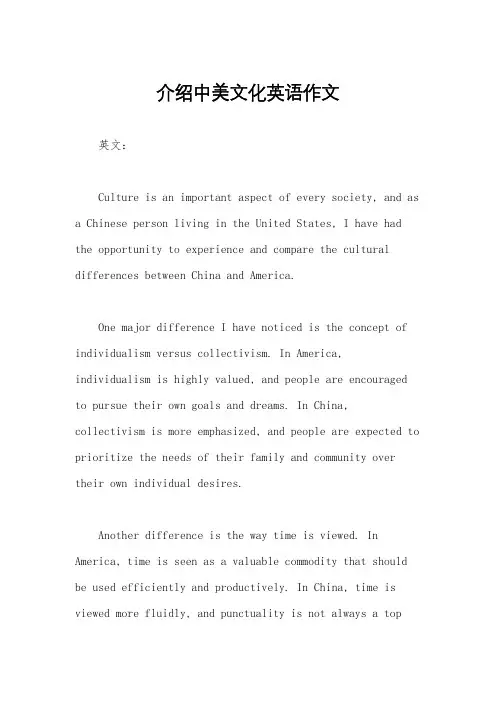
介绍中美文化英语作文英文:Culture is an important aspect of every society, and as a Chinese person living in the United States, I have had the opportunity to experience and compare the cultural differences between China and America.One major difference I have noticed is the concept of individualism versus collectivism. In America,individualism is highly valued, and people are encouraged to pursue their own goals and dreams. In China,collectivism is more emphasized, and people are expected to prioritize the needs of their family and community over their own individual desires.Another difference is the way time is viewed. In America, time is seen as a valuable commodity that should be used efficiently and productively. In China, time is viewed more fluidly, and punctuality is not always a toppriority.Food is also an important aspect of culture, and the differences between Chinese and American cuisine are significant. Chinese cuisine is known for its use of bold flavors and spices, while American cuisine tends to be more bland and focused on convenience.Finally, communication styles differ between the two cultures. In China, indirect communication is more common, and people often use hints and implicit language to convey their thoughts and feelings. In America, direct communication is preferred, and people are encouraged to be straightforward and honest in their communication.Overall, the cultural differences between China and America are vast and complex, and it is important to be aware of and respect these differences in order to foster understanding and mutual respect.中文:文化是每个社会的重要方面,作为一个生活在美国的中国人,我有机会体验和比较中美文化之间的差异。
中美文化差异中英文版本中美文化差异中英文版本Many people have criticized Amy Chua. Some say her parenting methods were abusive. She even admits that her husband, who is not Chinese, sometimes objected to her parenting style. But she says that was the way her parents raised her and her 3 sisters. Ms. Chua makes fun of her own extreme style of parenting. She says she eased some of the pressure after her younger daughter rebelled and shouted "I hate my life! I hate you!" Ms. Chua says she decided to retreat when it seemed like there was a risk that she might lose her daughter. But she also says American parents often have low expectations of their children's abilities."One of the biggest differences I see between Western and Chinese parenting is that Chinese parents assume strength rather than fragility."Stacy DeBroff has written 4 books on parenting. Ms. DeBroff says Amy Chua's parenting style is not limited to Chinese families. She says it represents a traditional way of parenting among immigrants seeking a better future for their children. But she also sees a risk. When children have no time to be social or to follow their own interests, they might not develop other skills that they need to succeed in life. Stacey DeBroff advises parents to develop their own style of parenting and not just repeat the way they were raised.许多人批评了艾米·蔡。
中西方节日文化差异英文作文Culture Differences of Chinese and Western Traditional FestivalAbstractTraditional festivals are the historical products of a nation’s development. Whether in China which has a long history of more than five thousand years or in the newborn America, the origination of traditional festivals in the two countries is similar. Most traditional festivals originated from people’s expectation for harvest in the agricultural production, the worship towards the gods and the nature, sacrifices to the historical characters and etc. After the long-term evolution, traditional festivals have become an indispensable part of the national culture. Through traditional festivals, the distinct cultural characteristics of a people and the national spirits can be observed. Since the ancient time, China has been a large agricultural country, the small-scale economic mode known as ―The men plough and the women weave‖ initiated the agricultural civilization of Chinesecharacteristics. Chinese traditional festivals are deeply rooted in the agricultural civilization and greatly influenced by Confucianism. To some extent, Chinese traditional festivals have relieved from the primitive taboos and tended to be happy festivals which reflect the concept of harmony and integration in Confucianism. In America, religion plays a very important role in people’s life. With various branches, the religious system of America is quite complicated, among which Christianity is of the greatest importance. Some American traditional festivals are the direct products of Christianity and most festivals have evolved into the religious festivals later. This paper is designed to discuss the differences in customs, origins and other aspects of traditional festivals with the similar cultural connotation, then analyze the reasons lying behind the differences and finally reflect the cultural differences of the two nations. The paper also analyzes the mutual fusion in tradtional holidays between China and the west.Key words: Traditional festivals; Chinese and American culture; cultural differences; causes; mutual fusion.中西方传统节日文化的差异摘要传统节日是一个民族发展的历史产物。